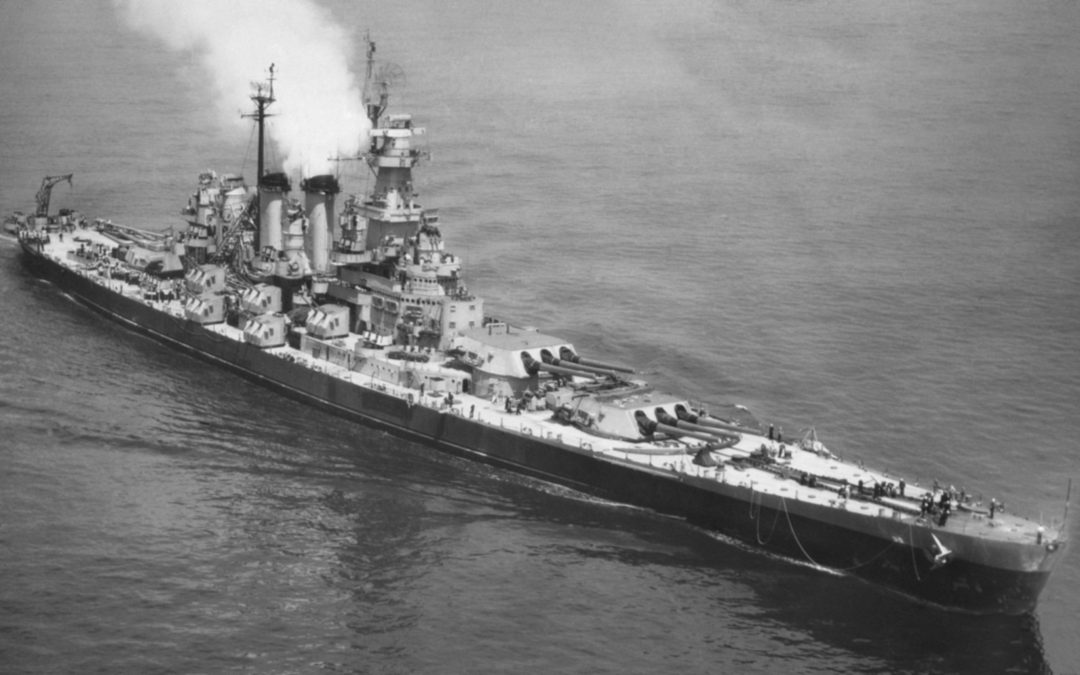Christmas 1943
“And that, of course, is the message of Christmas. We are never alone. Not when the night is darkest, the wind coldest and the world seemingly most indifferent.” Taylor Caldwell
August 1943 – U.S.S. North Carolina – South Pacific Ocean: Lutheran Chaplain Everett Wuebbens needed a way to raise the morale of the men aboard the massive battleship. Many 18 and 19-year-old sailors were away from home for the first time. With Christmas still four months away, Wuebbens was working on a project. He sat in his small office and typed a letter to the toy department at Macy’s Department Store in New York City.
“Dear Sir – enclosed is $2,404.25 for which we ask you to provide us the following service: Select a Christmas gift valued at approximately $3 for each of the children listed in the enclosure. The remainder of the money should be used for wrapping and mailing the gifts to the addresses listed. We realize we are asking a great deal, but we are confident that you can and will deliver. You will be adding greatly to the happiness of our children and to our own Christmas joy out here in the Pacific war zone. Very truly yours, E.P. Wuebbens – Chaplain, U.S. Navy.”
Hoping Macy’s would deliver the presents to the respective addresses, Weubbens stuffed the money and Christmas list into a shoe box. He mailed it to Macy’s headquarters in New York City.
During World War II, most homes in America had a family member serving in the armed forces thousands of miles from home. More than 12 million Americans were in military service, representing almost 10% of the country’s population. Millions of others worked in jobs directly supporting the war effort.
In April 1941, the North Carolina, a new class of fast battleships, had been commissioned in the Brooklyn Shipyard and arrived at Pearl Harbor shortly after the Japanese attack. More than two football fields long, the crew consisted of 2,100 officers and sailors.
Before sending the letter to Macy’s, Wuebbens collected $5 from each serviceman who wanted to send his children a Christmas present back home. The chaplain asked Macy’s to choose an appropriate gift from their catalog, which included popular toys like tinker toys, dolls, musical instruments, books, footballs, baseball gloves, slinkies and yo-yos.
Macy’s gladly fulfilled the order request. Employees wrapped 729 packages and mailed them to children all over the country. When the task was complete, Macy’s sent a package back to the ship. It was a film canister with Merry Christmas written on it.
On Christmas Eve night, Wuebbens arranged a ship variety show which included singing, dancing, skits, comedians and Christmas carols. Finally, it was the chaplain’s turn at the microphone. He shared that all the gifts back home had been delivered courtesy of Macy’s. Then he mentioned a special Macy’s gift for the crew. The lights were dimmed, and the film projector began flickering as the band played Christmas carols.
On the screen was a young mother holding a baby and waving. A sailor yelled, “Oh my god, that’s my wife. I miss you, baby.” Then more images of wives and children, more scenes from America. A young boy missing his front teeth and waving at the camera. A mother and her 5-year-old posing by the Christmas tree. Scared, lonely wives blowing kisses to their husbands a world away. For more than an hour, sailors watched teary-eyed as wives, children and loved ones appeared on the screen with holiday wishes. That night sailors re-watched the movie until the projector overheated.
On Christmas Day, after a feast of turkey, ham, oyster dressing, cranberry sauce, giblet gravy, Parker House rolls and deserts, the North Carolina, having enjoyed a few days of R&R, received orders to provide battle support for a carrier attack somewhere in the South Pacific. The North Carolina would become the most decorated battleship in World War II.
With the world at war on that Christmas 80 years ago, I’ll Be Home for Christmas was America’s most popular holiday song. Sung by Bing Crosby and released just three months before the holidays, it was also the most requested song at American military U.S.O. shows on the war fronts in Europe and the Pacific. In the song, an American serviceman who was away from home for the holidays, promises he will be home for Christmas, “if only in my dreams.”
Although the 2,100 men of the North Carolina were a long way from home at Christmas 1943, a bit of home had been brought to them. Thanks to Chaplin Everett Wuebbens and Macy’s, they were home for Christmas, if only in their dreams.

Macy was ahead of their time with Facetime. very thoughtful them. I wonder if we still have that kind of heart in our corporate culture today…
You can still visit that famous ship in Wilmington, North Carolina. It’s always good to get films and packages from back home. I spent the Christmas of 1977 on board the aircraft carrier, USS America in the Mediterranean. Still fond memories shared with a great group of guys. Mike Mixon
Tears in my eyes as I read that story. I was born in 1943 and i still remember my Dad telling me that the draft board would not let him volunteer as he was working in an essential industry and could not join!!! Patriotism was extremely high at that time.